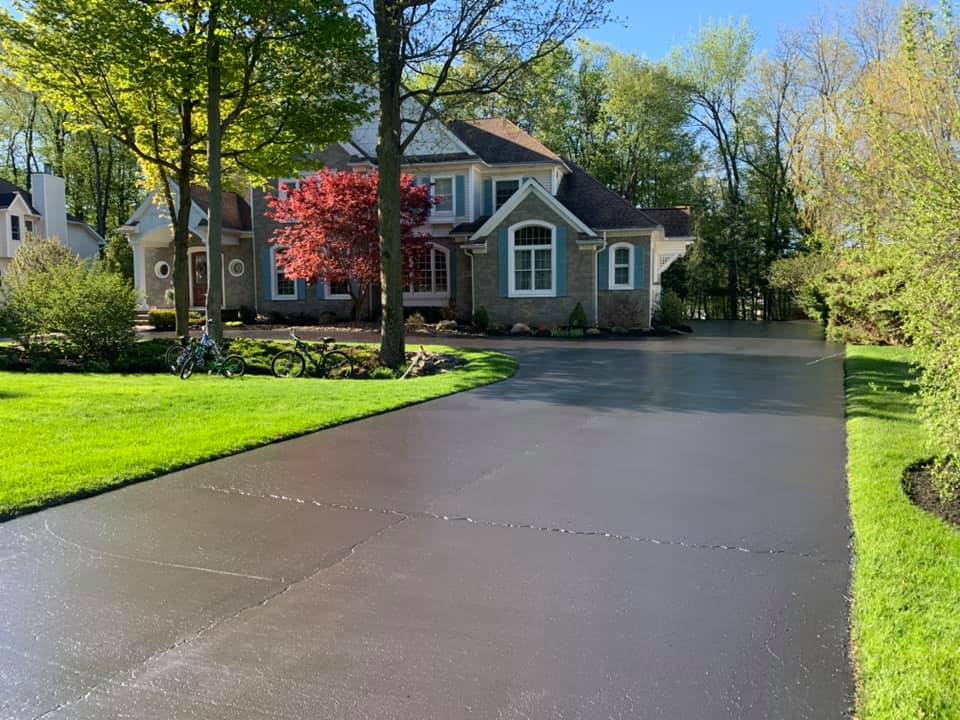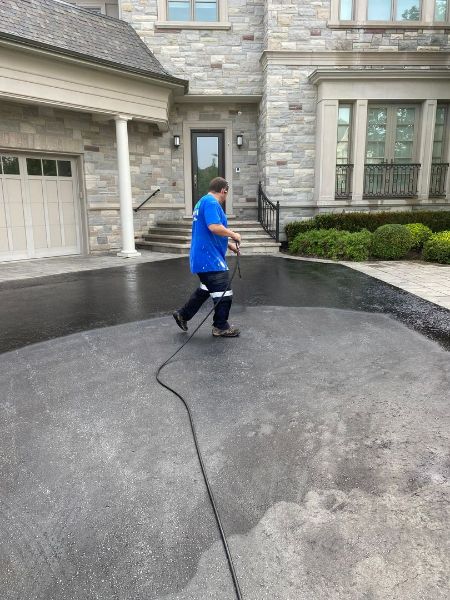Boost Commercial Allure: Warm Mix Asphalt Sealing for Angled Parking Lots
Boost Commercial Allure: Warm Mix Asphalt Sealing for Angled Parking Lots
Blog Article
Warm Mix Asphalt: A Lasting Service for Sidewalk
Hot Mix Asphalt (HMA) has become a leading sustainable selection for sidewalk options, supplying a myriad of cutting-edge modern technologies and environmental advantages. Its ability to minimize and recycle materials power consumption presents an engaging instance for its fostering in road construction jobs. The lasting performance and resilience of HMA make it a favored choice for facilities advancement. As the need for environmentally friendly building practices grows, discovering the nuances of HMA's sustainability can provide useful understandings into the future of sidewalk options.
Environmental Benefits of Hot Mix Asphalt

In Addition, Warm Mix Asphalt helps to reduce metropolitan warm island impacts. Its dark shade absorbs sunshine, minimizing the quantity of warmth showed back right into the atmosphere compared to lighter-colored sidewalks. This can reduce ambient temperatures in metropolitan locations, lowering the need for cooling and eventually decreasing power consumption.
On top of that, Warm Mix Asphalt adds to improved stormwater administration. Its porous nature enables water to infiltrate the pavement and charge groundwater supplies, lowering runoff and the risk of flooding. These ecological advantages make Warm Mix Asphalt a sustainable option for paving roadways and highways.
Power Efficiency in HMA Production
Is energy efficiency a critical variable in the manufacturing of Hot Mix Asphalt (HMA)? Definitely. Energy plays a considerable role in the production of HMA, influencing both price and ecological sustainability. One key facet of power effectiveness in HMA manufacturing is making use of cozy mix asphalt (WMA) technologies (regrading). WMA permits the mixing and positioning of asphalt at lower temperatures compared to typical hot mix asphalt, resulting in reduced energy intake throughout production. This process not only reduces fuel usage yet additionally lowers greenhouse gas exhausts, making it a much more environmentally pleasant choice.
Furthermore, advancements in plant technologies have led to even more energy-efficient HMA manufacturing processes. Modern plants are developed with features like recycled asphalt pavement (RAP) handling abilities, efficient heater systems, and enhanced insulation, all contributing to power savings. By maximizing energy use in HMA manufacturing, the industry can minimize its carbon footprint while keeping top notch pavement products. Power efficiency is, consequently, an important consideration in making sure the sustainability of Hot Mix Asphalt manufacturing.
Recyclability of Warm Mix Asphalt
The recyclability of Hot Mix Asphalt (HMA) is a pivotal facet of its sustainability and long-term ecological effect. HMA is among one of the most recycled materials in pop over to these guys the United States, with over 100 million lots of reclaimed asphalt sidewalk (RAP) being recycled annually in new sidewalk construction. Recycling HMA uses a number of environmental advantages, such as decreasing the demand for virgin products, decreasing power consumption throughout production, and lowering the quantity of waste sent to land fills.
The process of reusing HMA includes milling the existing sidewalk, crushing it right into smaller sized items, and mixing it with brand-new accumulation and asphalt binder to produce a recycled mix. This recycled mix can commonly do as well as or perhaps better than conventional HMA, while requiring less raw materials and generating lower greenhouse gas discharges. By including RAP into brand-new sidewalk projects, road agencies can conserve natural deposits, lower costs, and minimize the ecological footprint of road building and construction and maintenance activities. In general, the recyclability of HMA plays a significant function in advertising sustainable methods within the pavement market.

Long-Term Performance of HMA
Asphalt sidewalks show longevity and strength over an extended duration, reflecting the long-lasting performance of Hot Mix Asphalt (HMA) Furthermore, developments in HMA innovation, such as the usage of polymer-modified binders and warm mix asphalt, have actually further improved the resilience and longevity of HMA pavements. By prioritizing quality building and construction and maintenance practices, HMA continues to prove itself as a sustainable and cost-efficient option for resilient pavement facilities.

HMA: Durability and Sustainability
Demonstrating both resilience and sustainability, Hot Mix Asphalt (HMA) has actually ended up being a cornerstone in the building and construction of resilient pavement frameworks - angled parking. HMA's longevity comes from its capacity to withstand heavy lots, severe climate problems, and high traffic quantities, making it a dependable option for roadways, freeways, and airport terminal paths. The composition of HMA, which commonly includes accumulations, binder, and filler, plays a critical function in boosting its longevity and resistance to tear and wear
Moreover, HMA's sustainability hinges on its recyclability and energy-efficient production process. The ability to recycle reclaimed asphalt you can try here pavement (RAP) in brand-new HMA mixtures decreases the need for virgin products and minimizes the environmental influence of pavement construction and maintenance. Furthermore, the power effectiveness of producing HMA exists in its reduced blending temperatures compared to other pavement materials, resulting in reduced energy usage and greenhouse gas discharges.
Conclusion
To conclude, hot mix asphalt (HMA) provides a lasting solution for sidewalk with its eco-friendly qualities. HMA's recyclability, power effectiveness in manufacturing, and lasting longevity make it an environment-friendly choice for roadway construction. By conserving natural deposits, lowering waste, and decreasing greenhouse gas discharges, HMA plays an important role in advertising sustainability in framework development. Its ability to reduce urban warmth island impacts further emphasizes its relevance in developing eco aware and resistant sidewalk systems.
HMA is one of the most recycled products in the United States, with over 100 million bunches of recovered asphalt sidewalk (RAP) being reused each year in brand-new pavement building and construction.The process of recycling HMA includes grating the existing pavement, squashing it right into smaller pieces, and mixing it with brand-new aggregate and asphalt binder to create a recycled mix.Asphalt pavements show resilience and durability More about the author over an extensive duration, mirroring the long-lasting efficiency of Warm Mix Asphalt (HMA) In addition, innovations in HMA technology, such as the use of polymer-modified binders and cozy mix asphalt, have actually even more boosted the sturdiness and longevity of HMA sidewalks. The capability to recycle redeemed asphalt pavement (RAP) in brand-new HMA mixtures decreases the demand for virgin materials and lessens the environmental effect of sidewalk construction and maintenance.
Report this page